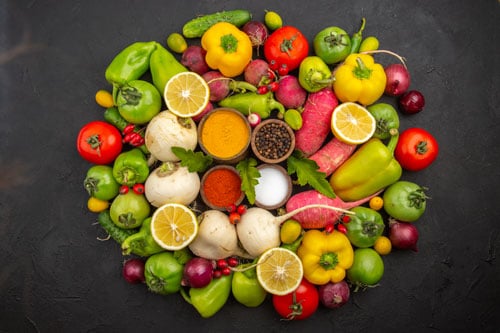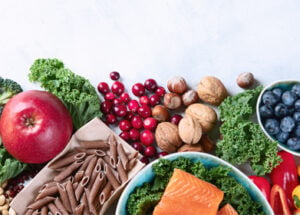Importance Of A Balanced Diet
January 24, 2022

A balanced diet contains different kinds of foods in certain quantities and proportions so that the requirement for calories, proteins, minerals, vitamins and alternative nutrients is adequate.
The significant meaning of a balanced diet can’t be underlined enough for a solid way of life or a healthy lifestyle. A healthy lifestyle can be procured by maintaining a balanced diet and keeping it in mind to meet all the essential nutrients needed by the body. An appropriate meal plan assists with accomplishing ideal body weight and diminishes the risk of chronic diseases like diabetes, cardiovascular and other types of cancer.
A balanced diet should comprise 60-70% of total calories from carbohydrates, 10-12% from proteins and 20-25% of total calories from fat. Most of the daily calories come from the food that one consumes. For example,
- Fresh fruits and vegetables
- Whole grains
- Legumes
- Nuts
Contents
Importance of a Balanced Diet
There are five reasons which highlight the importance of a balanced diet.
- Puts a stop to diseases and infections- When you eat vitamins, minerals and other nutrients through your daily meals, you are most likely to improve your immune system and your healthy diet may even help prevent diseases like heart disease, diabetes, and stroke.
- Helps you control your weight- People at some point want to lose weight or gain weight. Eating a balanced diet helps you control your weight and maintain it over time, however, it is not feasible to be on a weight-loss diet forever, yet, a balanced diet is the only way to healthily control your weight in the long term.
- Improves mental health- Getting the blend of nutrients can help to ease symptoms of depression and anxiety. Looking after yourself by eating well is essential as it aids to keep up good mental health.
- A balanced diet is of prime importance for children and adolescents- As children grow they need to receive the right nutrients so that cells are built and maintained and the body grows in the right place.
- Better skin and hair. A healthy balanced diet also improves your looks. Eating well contributes to healthy skin and hair and a “glow” that makes you look younger.
Importance of calories in a balanced diet
The quantity of calories in a portion of food refers to how much energy is stored in that food. Your body involves calories from nourishment for strolling, thinking, breathing, and other significant capacities.
Calories are a mark of the energy content in the food. When you consume the food, the calories are devoured when you walk, think, or relax. By and large, an individual might need around 2000 calories every day to keep up with their body weight. Generally, an individual’s calories might rely upon their sex, age, and physical activity. In addition, men need more calories than women. Individuals who are more into exercising require more calories in contrast to individuals who don’t. It’s likewise essential to recall that the source of calories is similarly significant as the number of calories.
Empty calories are the calories that don’t contain any nutrition and they can be found in foods such as:
- Sugar
- Butter
- Cookies
- Cakes
- Energy drinks
- Ice cream
Tips to Maintain a Balanced Diet
A balanced diet comprises carbohydrates, proteins and fats, vitamins and minerals are essential for maintaining a balanced diet. Each of these has a significant role and helps a person feel better.
1. Carbohydrates
Foods high in carbohydrates are an important part of a healthy diet. Carbohydrates provide the body with glucose, which is converted to energy used to support bodily functions and physical activity. Choose wisely from complex carbohydrate sources such as whole grains-wheat, millets, brown rice etc.

2. Protein
Proteins are large, complex molecules that play many critical roles in the body. They do most of the work in cells and are required for the structure, function, and regulation of the body’s tissues and organs. It is also essential for growth and development during the various stages of life. About 25% of daily calories should come from a protein found in pulses like- moong dal, urad dhal and legumes like kidney beans (rajma), black-eyed beans, and chickpeas (channa). Milk and milk products like -paneer, curd, and yoghurt are also great sources of protein. For the non-vegetarians, good sources include eggs, fish and lean meat.

3. Fats
Fats contribute to about 15% of daily caloric needs and are a major energy source. They are also vital for storing and providing vitamins and synthesizing hormones. Some of the good sources of fats for one’s daily diet can come from polyunsaturated fats such as flax seeds, sunflower seed etc., The non-saturated fats such as olive oil, sesame oil etc., and saturated fats such as butter, and ghee however, remember to use these in moderation.

4. Vitamins and Minerals
Vitamins and minerals support metabolism, nerve and muscle function, bone maintenance and cell production. Fruits and vegetables are the major sources of vitamins and minerals including potassium, iron, vitamin A and vitamin C.

5. Water
Life without water is unimaginable. A major nutritional component that helps regulate body temperature, lubricate your joints and protects your major organs, and tissues. Water also aids to transport oxygen throughout your body. Make sure that you drink at least 8 glasses of water every day.

Benefits of Balanced Diet
- Opting for a balanced, adequate and varied diet is an important step toward a happy and healthy lifestyle.
- Vitamins and minerals in the diet are vital to boost immunity and healthy development,
- A healthy diet can protect the human body against certain types of diseases, in particular noncommunicable diseases such as obesity, diabetes, cardiovascular diseases, some types of cancer and skeletal conditions.
- Healthy diets can also contribute to adequate body weight.
- Healthy eating is a good opportunity to enrich life by experimenting with different foods from different cultures, origins and with different ways to prepare food.
Also Read: Immune-Boosting Foods
Steps to stay healthy
- Include healthy proteins and milk products, pulses and lean meats.
- Eat more vegetables and fruits.
- Limit the intake of processed foods and cut down on extra salt and sugar.
- Be mindful of what you eat.
- Fix times to have meals and stick to it.
- Eat only when you feel hungry.
Foods To Avoid in a Balanced Diet:
Some of the food groups to stay away from on a balanced diet include:
- Processed foods
- Refined grains
- Added sugar and salt
- Red and processed meat
- Alcohol
- Trans and saturated fats
A balanced diet supplies the human body with essential nutrients that your body needs to work effectively. If you are having an unbalanced diet, the system is prone to disease, infection, fatigue, and poor performance. Children who are deprived of healthy foods may face growth and developmental issues, poor academic performance and are highly prone to persistent infections.
Get a full body checkup to know what kind of healthy diet you need to follow. Doctors from our multispecialty hospital can guide you with the right treatment and medication









